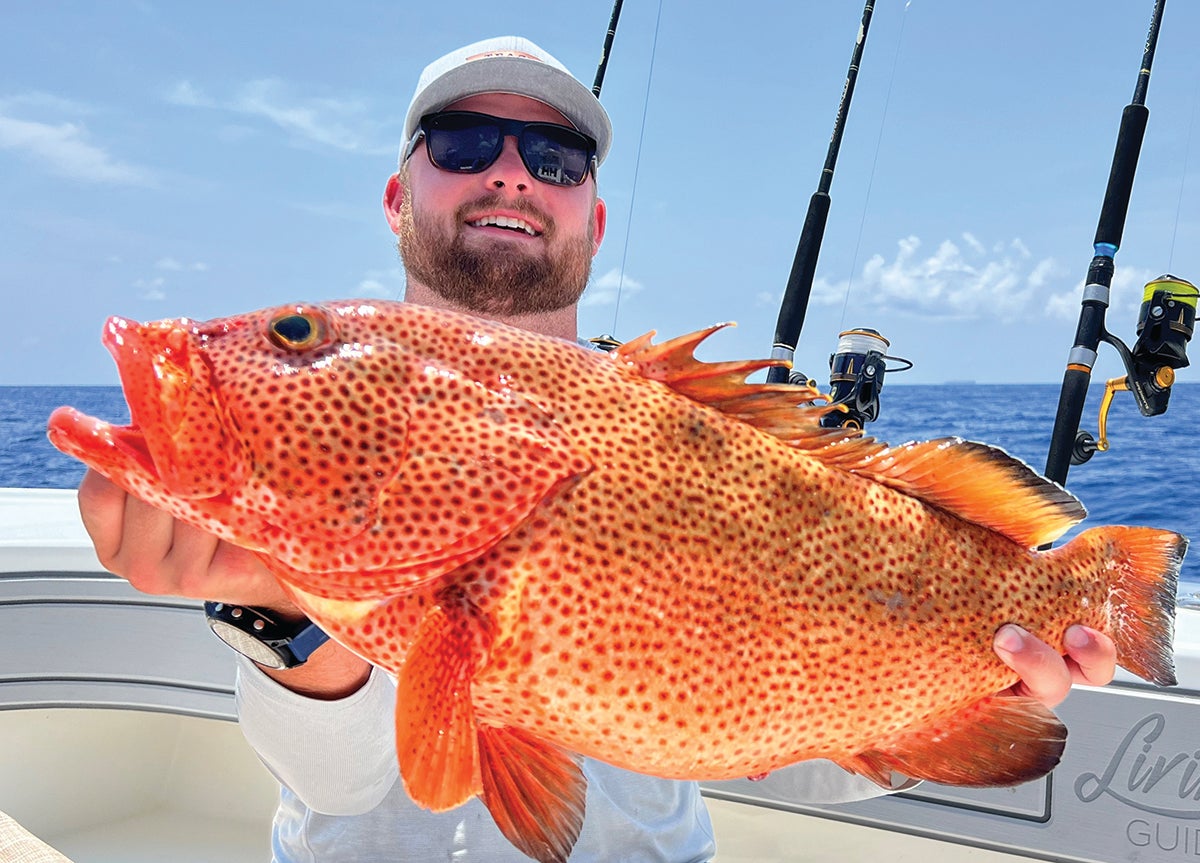Channel catfish, red hind records broken
Published 1:35 pm Tuesday, July 25, 2023

- Justin Hall of Reidsville caught this 27-pound, 7-ounce channel catfish, the new state record, from a Rockingham County farm pond on May 21. - Photo courtesy NC Wildlife Resources Commission
|
Getting your Trinity Audio player ready...
|
A couple of weeks ago, I quizzed a bass fisherman at Winston-Salem’s Salem Lake about his success on the hottest of days, and one tidbit I paid careful attention to – besides the lure he was using and how deep the fish were holding – was the surface water temperature.
The man said that the thermometer associated with his depth finder read 86 degrees.
Folks, that’s not lake water, that’s bath water, but fish will still bite, and many bass fishermen still want to release their fish alive after experiencing the joy of the catch.
Trending
That can entail a little bit of preparation.
A handful of tips:
• Keep the fish out of the water for as short a period of time as possible. The quicker you return the fish to the water, the better its chances of survival. If you want to take a photo, get it done quickly. If it’s an especially big bass, make sure to support its body – don’t let the entire body weight hang from its jaw, where you’ve got your thumb and forefinger clamped down.
• Keep your hands off the fish as much as possible. One of a fish’s biggest survival mechanisms is a slippery layer on its scales called its “slime coat.” Remove the slime coat by holding the fish too long or in a rough manner, and the fish will be subject to getting infections that may cause it to die.
• If you are using a landing net, one with a rubberized coating is much better for the fish. Nets made out of coated nylon can damage a fish’s slime coat.
• Don’t ride the fish around in your livewell for any length of time, unless you’re in a tournament and it’s unavoidable. If you have to keep the fish in a livewell for any amount of time, keep the water circulating as much as possible – even continually running the aerator. If the water temperature is around the 80-degree mark or higher, consider adding ice to the water to cool it. The best way to add ice is with a milk jug or other plastic container that’s been filled with water and frozen beforehand. It will cool the water gradually, which is better for the fish, and it’s better than bag ice, which is sometimes made with water that has chemicals that aren’t great for fish, either.
Trending
• When you’re ready to release the fish, don’t just chuck him over the side of your boat, kneel down against the gunwale, without relaxing your grip on the fish’s lower jaw, and slide the fish into the water, moving it forwards and backwards for 30 seconds or so to get water flowing back through the fish’s gills. Then simply let go and watch it swim away.
Record catfish
Rockingham County has gotten a lot of notice over the past 10 years for the number of huge white-tailed deer, but those bucks take a back seat to the latest offering from the northern Piedmont County.
The N.C. Wildlife Resources Commission has certified that a huge channel catfish, caught two months ago from a farm pond near Reidsville, is the new state record.
Justin Hall of Reidsville landed the 27-pound, 7-ounce fish on May 21, a monster that was 36¼ inches long and more than 24 inches in girth. It broke the previous record, a 26-pound catfish caught from the Neuse River on July 21.
According to the NCWRC, Hall’s 13-year-old son caught a huge catfish earlier in May. Unaware of the record, he released it back into the lake. About a week later, Hall was using bread dough for bait on a Big Cat Fever rod and Zebco Big Cat XT reel when he hooked the fish. His wife netted the huge fish, and according to Hall, its weight bent the net.
Hall got the fish weighed on certified scales and submitted it to the NCWRC for state-record certification.

Harrison Bachman’s 9-pound, 12.1-ounce red hind, caught June 30 off Wrightsville Beach, is the new state record.
-Photo courtesy NC Division of Marine Fisheries
Bottomfish record
Red hinds are among a handful of bottomfish that anglers along the North Carolina coast regularly run into when dropping bait down into hardbottom areas.
Harrison Bachmann of Wrightsville Beach caught the biggest one ever caught in North Carolina waters on June 30. His 9-pound, 12.1-ounce fish was caught off his home port. His fish was certified earlier this month as the new state record. It broke a year-old record of 7 pounds, 11.2 ounces caught last year near Frying Pan Tower off Cape Fear.
Bachmann’s fish was 25 inches long and 23¼ inches in girth. He caught it on squid, fished on a Penn Carnage III rod paired with a Penn US Senator 113N reel spooled with 50-pound test line.
Red hinds are members of the grouper family, often mistaken for strawberry groupers or rock hind; the difference is slight, in coloration, spots and fins.





